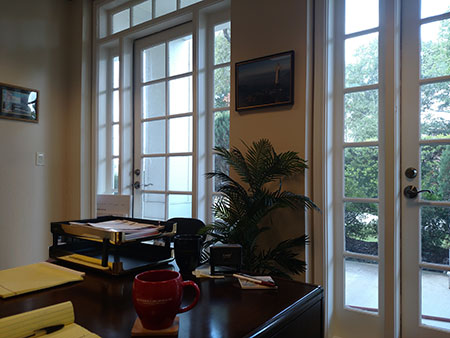 RutLaw Blog Friday, October 30 2015
Two presidential administrations, two governors, two law firms, and more than seven years ago I began working on case for a group of trustees seeking to protect and preserve their church property against claims that it was held in trust by a now-unfriendly national denomination. And finally, this summer we put the case to bed with happy clients and a great result. It is hard to see how this happened in retrospect, because it seemed like we took it on the chin a lot along the way. I guess it seems that way because actually, well, we did. That is, much like America lost most of the battles in the Revolutionary War and still won her independence from Britain in a long war, in our case, we lost at every level, too; but, in the end, we won the war. We prevailed because we had a client that allowed us to do the legal work and research necessary to prevail, and also because our client was committed to the process and all-in. And we prevailed because the court (in this case, the Texas Supreme Court) did its part, and in the end, we had some luck, or rather, perhaps Providence, to make it all happen. Our clients came to us in 2008 to find a way forward in the light of their national denomination’s aggressive posture toward local churches seeking to leave the denomination with their property. Specifically, the denomination asserted that it had a trust interest in all local church property based upon a solitary clause in its voluminous church constitution. The question therefore was: Could an ostensibly hierarchical church denomination (as this one was) claim a trust interest in its own constitution without ensuring that the interest complied with Texas property/trust law? As of 2008, the predominant thinking in Texas was that the answer to that question was “yes.” However, we believed that the sole Texas Supreme Court case on the subject – Brown v. Clark from 1909 – had been misread by subsequent appellate courts and that, in fact, Texas would apply “neutral principles” of law (that is, look at the deeds, record instruments of title, and Texas property and trust law to determine ownership). So, our client agreed to file suit and become the first group to bring suit against the national denomination in Texas. And, as mentioned above, it was a rocky road. We lost in the trial court via summary judgment. As nervous church members looked on, we lost in the appellate court, as well, as both courts relied upon their understanding that Texas deferred to hierarchical denominations. Remarkably, shortly after we lost our initial round in the court of appeals, though, the Texas Supreme Court decided – for the first time in more than a century – to review two church property cases and clarify what rules apply in such cases and would apply going forward. Thus, in Masterson v. Diocese of Northwest Texas, the Supreme Court reviewed these church property cases, and as the court began this process, we filed a Motion for Rehearing in the court of appeals, asking the court to wait to finally adjudicate our case until Masterson was decided. The court of appeals thus waited. And so, the waiting game … continued for us, as well. Finally, on August 30, 2013, the Texas Supreme Court announced its decision in Masterson. Simply put, the opinion was a candid, and frankly unusual, example of judicial clarity that pronounced, once and for all, that Texas would follow a neutral principles analysis and treat church entities as all other property owners. In reversing the summary judgment in favor of the national church in Masterson, the Supreme Court also took the unusual step of announcing how certain issues (not technically before the court for review) would be analyzed going forward. In laying out its decision-making process in total, the Supreme Court was effectively helping the parties in the Masterson case -- and others, including ours -- to evaluate how their cases would be decided so that parties and the courts below could proceed accordingly. We then waited through the Masterson rehearing process, which finally ended at the end of 2014. At that point, we filed our own motion for summary judgment, asking the trial court to rule that we were the rightful owners of our property and that it was not held in trust. In the face of our motion, the national denomination asked for a delay from the court so our case could be mediated and potentially settled. As a result, we went to mediation and the case was resolved. We left with quitclaims deeds for our personal and real property, and we made no payment to the denomination to do so. Of course, it was our position that this was the right result from the beginning. But we had to go through this process to get here. And so, we did. Again, without a committed client, one that allowed us to do all the research and work necessary to win, and without courts doing their jobs, and, well, in this case, a little good timing … you can decide why we got it, I have my thoughts … none of this would have happened. But it did. It is rewarding to see the system work and for good people to get the results they deserve. |
|
|
|



